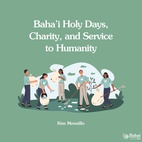The views expressed in our content reflect individual perspectives and do not represent the official views of the Baha'i Faith.
What do we mean, exactly, when we say that something must be done (or undone), or thought about (or dismissed) for God’s sake? Or when we say that universal exclamation “Oh my God!” (OMG!) And how does it come about that people like me learned to say “for cryin’ out loud” as a somehow cleaner if even less comprehensible alternative to “for God’s sake” – usually clipped bare to fergawdsake. Or, how about with Jesus perhaps vaguely in mind, ferchrissakes?
Pardon my irreverence, please, but listen, who really believes in God anymore anyway? Well, lots of people do, and I suspect that more would, fashionable intellectualism aside, if only the idea of the Creator weren’t so polluted by fairy tale images, anti-scientific credos and rancid politics.
Here is one thing we might mean when we use these phrases. When we do things at our most sincere, or our most urgent or beneficent or noble, we are helping God out, doing the (theoretical) Lord and Master of All Things a good turn. Well. This assumes that the Prime Mover needs a nudge in the right direction from one of the millions of species populating one little blue planet. That doesn’t make a lot of sense, but I detect this underlying thought in some brands of fundamentalism. It’s at least arrogant, if not delusional, to think that Something capable of fashioning a universe needs my advice or yours, so maybe that’s not quite it.
Or it could be this: we do things “for God’s sake” as an expression of obedience to divine authority, a more or less mysterious higher power. This idea gives the heebie-jeebies to the anti-faith crowd, and sometimes for good reason. Never mind just taking the name of God in vain; the so-called “will of God” has been invoked not just uselessly, carelessly, but also hatefully, bloodily. Taken with several grains of humility, though, the admission of a greater reality than our own minds, and submission to it, comes closer to the thinking of most conventionally religious people. It also scores higher on the common-sense test than the idea that the Great Spirit needs our know-how.
The thorny thing here, of course, is the too-frequent likelihood that someone feels he has certain, absolute knowledge of what an inscrutable Providence desires – this in the context of the welter of wildly differing and often just plain nutty views that theological certainty produces. The Baha’i conviction is clearly stated by Shoghi Effendi:
Its teachings revolve around the fundamental principle that religious truth is not absolute but relative, that Divine Revelation is progressive, not final…. It proclaims all established religions to be divine in origin, identical in their aims,…indispensable in their value to mankind. – World Order of Baha’u’llah, p. 58
Or as Paul phrased it in 1 Corinthians 13:12, on this earthly plain “we see through a glass, darkly”; our vision is unclear, unreliable, which should be an antidote for oppressive ideology. This doesn’t suggest, not in the least, that faith is useless, or that a degree of spiritual certitude is therefore impossible. Holding to such relativity in religion is simply humble, and it doesn’t seek to condemn, as dangerous fanatics, all those folks who feel they have had a glimpse into some lofty sense of order, into the Tao. Most sincere religionists use such convictions to lead more kindly and useful lives, not to hate or harangue or blow up others.
Still, the implications of doing what the Maker wants can be unsettling when there are so many useless or scary conceptions of what the Maker has in mind. In this regard, the best source of sanity I know comes from another brilliant Baha’i conception: that of God as an “unknowable Essence”, an utterly unimaginable Force (or Being or Reality or pick your favorite limiting label for the Illimitable). I love the opening words of Lao Tzu (Laozi) in his masterwork, the Tao Te Ching (Dao De Jing, as it is known in modern pinyin notation): “The Tao that can be named is not the true Tao, and the Name that can be named is not the true Name…” There is wisdom and plainness and purity here. God cannot be known directly, said Baha’u’llah, but we have had glimpses, reflections of the Ultimate in the persons of the great Teachers, Moses and the Buddha, Krishna and the Christ and on and on.
For God’s sake? Perhaps this expression, finally and simply, is the best way to clarify that whatever we say and do isn’t for our own gain. FGS, this old phrase – which has lost most of what it originally meant, the fate of all thoughtless clichés – is meant to argue for purity of motive. It claims to reject selfish intent. When we say that words or deeds are “for the sake of God”, we invoke the direct opposite of egotism, narrowness, material ambition, the power grab and the vulgar mundane. That’s not the worst definition of “God” I’ve ever heard.


















Comments
Sign in or create an account
Continue with Facebookor